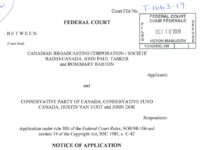The cost of wireless services emerged as a political issue during the recent national election, with most parties taking turns promising measures to increase competitiveness and lower consumer costs. The Liberals based their platform on a commitment to reduce costs by 25 per cent over the next two years, a measure that some analysts suggested had already been met. I argued that the 25 per cent reduction target was measuring the wrong thing, noting that “the 25 per cent price decline may sound attractive, but if other countries experience declines of 30 per cent or 40 per cent, it means that Canadians would actually be paying even more relative to consumers elsewhere.”
Archive for October, 2019
The LawBytes Podcast, Episode 29: Partisan Posts, Social Media, and Misinformation – Taylor Owen on What Actually Happened Online in the 2019 Election
Coming into the 2019 federal election, there were widespread concerns regarding disinformation campaigns, foreign interference, social media advertising and manipulation, and fake news. The federal government enacted legislation designed to foster greater transparency on political advertising, but on the heels of elections elsewhere, the prospect of online harms to the electoral process appeared very real. Taylor Owen of McGill University set out to find out what was actually taking place online. He joined me on the podcast shortly after the election to discuss how social media was being used, political advertising trends, the role of fact checking, and the presence of misinformation and fake news.
What Comes Next for Canadian Digital Policy Under a Liberal Minority Government?
In the closing months of the last Liberal majority government mandate, I spoke to a government official about the lessons learned from the prior four years. Their response? If we knew then what we know now, we would have moved much faster on policy. The four years moves very quickly and if you don’t manage to lay the groundwork and introduce proposed legislation within the first 12 – 24 months, it becomes very difficult to enact given competing policy priorities, demands on committee time, Senate review, and a myriad of other challenges.
As I think about what comes next for Canadian digital policy under the new Liberal minority government, those words strike me as more relevant than ever. Even if the government runs more like a majority than a minority (which certainly seems likely on digital policy as no one is forcing an election over privacy or wireless pricing), the same ministers return to their portfolios (which may or may not happen) and the same committee structures return largely unchanged (which will not happen since that INDU chair Dan Ruimy was not re-elected), picking up where the government left off in June will not be easy. Further, the Liberal platform provides the roadmap for future reforms, but moving rapidly on these issues – particularly given expectations that a minority government’s mandate may run shorter than a majority – suggests that quick wins will be preferred to extensive legislative reform.
So what are likely next steps on digital policy?
The LawBytes Podcast, Episode 28: The Past, Present and Future of Open Access – A Conversation with Leslie Chan
This week is open access week, an opportunity to celebrate and raise awareness of the emergence and continued growth of open access. Countries have been taking increasingly strong steps toward making their research openly available, with mandates that require researchers who accept public grants to make their published research results freely available online within a reasonable time period. Leslie Chan, a professor at the University of Toronto Scarborough and one of the earliest global leaders on open access, joins the podcast this week to discuss its past, present and future.
The CBC Lawsuit, Fair Dealing and Future Reform: The Unexpected Arrival of Copyright in Election 2019
As the 2019 federal election winds toward voting day next week, copyright has unexpectedly arrived on the scene. Cultural groups have lamented for weeks that none of the national political parties have discussed copyright, placed it in their platforms, or otherwise committed to reforms. The likely reason – neatly articulated by OpenMedia’s Laura Tribe in this week’s Lawbytes podcast – is that there are no sharp divisions between the parties on copyright that might provide an electoral advantage. Instead, the government conducted an extensive copyright review which led to the Industry Committee’s June 2019 report. That committee, which heard from hundreds of witnesses representing all perspectives, generated a report that received all-party support and provides a roadmap for future reforms (the notable exception being on crown copyright).



![Subhashish Panigrahi [CC BY-SA 4.0 (https://creativecommons.org/licenses/by-sa/4.0)] https://commons.wikimedia.org/wiki/File:Open_Access_Week_stencil_and_card_made_from_stencil.jpg](https://www.michaelgeist.ca/wp-content/uploads/2019/10/Open_Access_Week_stencil_and_card_made_from_stencil-200x150.jpg)







